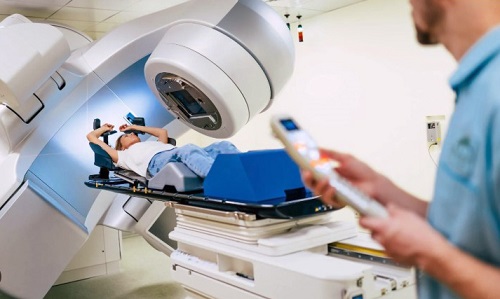Nikhil Prasad Fact checked by:Thailand Medical News Team Dec 29, 2024 1 year, 1 month, 1 week, 8 hours, 58 minutes ago
Medical News: Radiotherapy, often described as a precision tool in cancer treatment, has traditionally been recognized for its ability to destroy cancer cells by causing irreparable DNA damage. Over time, researchers have discovered that this treatment does much more than just target genetic material. It profoundly influences the metabolism of cancer cells, impacting their energy production and survival pathways. This
Medical News report will delve into the latest findings on the metabolic effects of radiotherapy and how these insights are shaping the future of cancer treatment.
 Impact of Radiotherapy on Cancer Metabolism
Impact of Radiotherapy on Cancer Metabolism
The review was conducted by a team of researchers from the Department of Clinical Oncology, Section of Radiation Oncology and Nuclear Medicine, AULSS 9 Scaligera, Verona, Italy, and the Department of Morphology, Surgery and Experimental Medicine at the University of Ferrara, Italy.
Understanding Metabolic Reprogramming
One of the hallmark features of cancer cells is their unique metabolic behavior, characterized by the Warburg effect. Unlike normal cells that rely primarily on mitochondrial oxidative phosphorylation for energy, cancer cells often depend on glycolysis even in the presence of oxygen. This metabolic reprogramming supports rapid cell division and survival under stressful conditions, such as treatment with radiotherapy.
Radiotherapy has been shown to disrupt these metabolic pathways, forcing cancer cells to adapt or succumb to the damage. The treatment increases the production of reactive oxygen species (ROS), which not only damages cellular components but also exacerbates metabolic stress. This creates a window of opportunity to target these cells with metabolic inhibitors, enhancing the effectiveness of radiotherapy.
Key Findings on Glucose Metabolism
Cancer cells heavily rely on glucose to fuel their growth and survival. Radiotherapy impacts glucose metabolism by damaging mitochondrial function, increasing reliance on glycolysis. This dependency can be exploited with drugs like 2-deoxy-D-glucose (2-DG), which inhibits glycolysis and amplifies the energy crisis in cancer cells. Clinical trials have shown promising results when combining 2-DG with radiotherapy, particularly in glioblastoma patients.
Lipid Metabolism Alterations
Lipid metabolism plays a crucial role in cancer progression, providing the building blocks for cell membranes and energy reserves. Radiotherapy has been found to disrupt this pathway by inducing oxidative stress and impairing the synthesis of fatty acids. Studies on fatty acid synthase (FASN) inhibitors, such as orlistat and TVB-2640, reveal that combining these agents with radiotherapy can significantly enhance cancer cell death, especially in tumors with high lipid metabolism activity.
Amino Acid Pathways
Amino acids, essential for protein synthesis and redox balance, are another target of radiotherapy. Glutamine, a vital amino acid, supports antioxidant defenses in cancer cells. By inhibiting glutamine m
etabolism with drugs like CB-839, researchers can enhance the oxidative damage caused by radiotherapy. Similarly, targeting serine and glycine pathways impairs DNA repair mechanisms, making cancer cells more vulnerable to radiation.
Advances in Imaging and Personalized Treatment
Innovations in imaging technologies, such as FDG-PET scans, allow clinicians to map tumor metabolism in real time. This helps identify metabolic vulnerabilities and tailor radiotherapy treatments to individual patients. Tumors exhibiting high glycolytic activity or dependence on fatty acid oxidation can be specifically targeted with complementary metabolic inhibitors, enhancing the overall therapeutic effect.
Conclusion and Future Directions
The findings highlight the transformative potential of integrating metabolic insights into radiotherapy. By targeting cancer-specific metabolic pathways, clinicians can improve treatment outcomes and overcome resistance in stubborn tumors. Innovations like FLASH radiotherapy, which delivers ultra-high dose rates to minimize damage to healthy tissues, and immune modulation therapies are promising avenues for future research.
The integration of metabolic profiling and advanced imaging techniques into routine cancer care marks a new era in precision oncology. As research continues, radiotherapy is evolving from a localized treatment into a comprehensive strategy that addresses the intricate metabolic and immunological landscape of cancer.
The study findings were published in the peer-reviewed journal: Cancers.
https://www.mdpi.com/2072-6694/17/1/54
For the latest Cancer News, keep on logging to Thailand
Medical News.
Read Also:
https://www.thailandmedical.news/news/curcumin-and-thymoquinone-team-up-against-melanoma
https://www.thailandmedical.news/news/singapore-study-finds-that-brief-exposures-to-magnetic-fields-can-enhance-uptake-of-breast-cancer-chemotherapeutic-drugs
https://www.thailandmedical.news/articles/cancer
